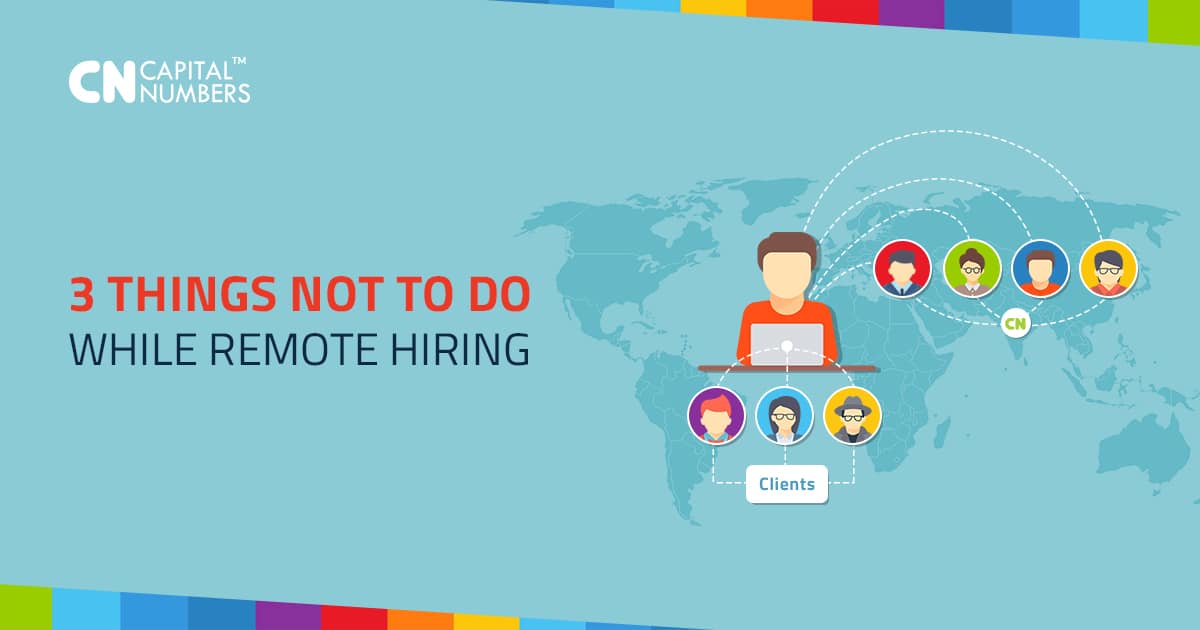3 Things Not to Do while Remote Hiring
Table of Contents
A lot of our clients at Capital Numbers are actually people whom we’ve never met before. Not that we mind that. In fact technology enables us to provide our services across all borders and beyond any boundaries; makes distances almost non-existent. But to think about it, we realize that forging great long distance work relationships is much more than just technology.
Like us, many are embracing virtual workspaces with open arms. It’s no secret why more companies and individuals are embracing it really. There are multitudes of research / numbers that justify its growing popularity. But the metaphorical shift is still much in theory than in practical. In the sense that with virtual workplaces come its several aspects like hiring remote employees, re-structuring employee evolution process etc. But most haven’t really changed their ways in that respect yet.
In this article, we try and better understand the gap between recruitment efforts and the actual needs of a virtual workforce;taking into consideration 3 situations that we have faced while being hired which can act as classic don’ts as far as remote hiring is concerned.
1. When we did not see each other at all before starting to work
Personality, verbal expression or body language may not seem very important while making a remote working deal. But that’s how we end up striking the wrong chord. It’s important to get an in-person feel of whoever we are starting to work with; and that’s fairly easy in today’s world where talking face to face across continents as been simplified to the level of a single tap. So we should not hesitate to engage in video conferences, facetimes or whatever seems fit.
The ones being hired and their employers should both get an insight into what kind of energy each can cast into the work culture, and how each of them fit into their common goals.
2. When they did not get a full tally of our skills before hiring us
Sometimes people get hired without being upto the mark as far as skills are concerned. The employer expects them to grow with and into the job after they start working. Also, for in-office hires most organizations have a full fledged training course in place to bring the employee up to pace with the job.
But training people across states or countries may prove quite a challenge. So employers should be absolutely clear with what skill sets are non-negotiable in a particular project. For employers it’s always best to tailor make assessments as per projects to hire just the right people.
3. When they asked us all the wrong questions
Most employers have a set of questions that they ask while recruiting. Those mostly cater to find answers that find relevance while recruiting for in-office staff. But when recruiting for remote workers, asking the wrong questions puts everyone in a false position. Questions not only help employers to understand people who they hire, they reveal as much about the employers as well. So it’s extremely important to ask just the right questions.
We at Capital Numbers spend most of our time working with people across countries, and believe that the foundation of a good project lies in being perfect fit not just to project needs but also to organizations that hire us.
As an organization, which of your needs do you think we can best cater to? Let us know at http://www.capitalnumbers.com/contact_us.php


 Web Development
Web Development Cloud Engineering
Cloud Engineering Mobile App Development
Mobile App Development AI/ML/GenAI
AI/ML/GenAI E-commerce
E-commerce Software Development
Software Development UI/UX
UI/UX QA
QA Dedicated Teams
Dedicated Teams











